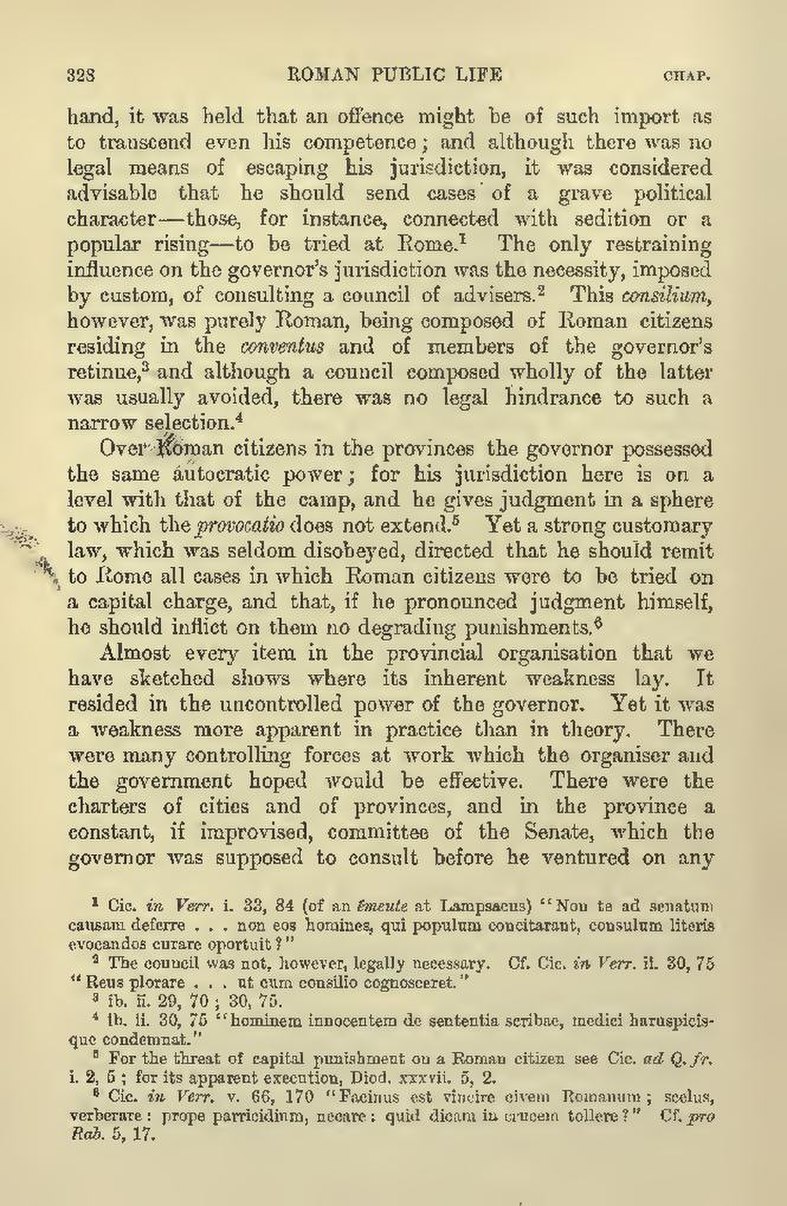hand, it was held that an offence might be of such import as to transcend even his competence; and although there was no legal means of escaping his jurisdiction, it was considered advisable that he should send cases of a grave political character—those, for instance, connected with sedition or a popular rising—to be tried at Rome.[1] The only restraining influence on the governor's jurisdiction was the necessity, imposed by custom, of consulting a council of advisers.[2] This consilium, however, was purely Roman, being composed of Roman citizens residing in the conventus and of members of the governor's retinue,[3] and although a council composed wholly of the latter was usually avoided, there was no legal hindrance to such a narrow selection.[4]
Over Roman citizens in the provinces the governor possessed the same autocratic power; for his jurisdiction here is on a level with that of the camp, and he gives judgment in a sphere to which the provocatio does not extend.[5] Yet a strong customary law, which was seldom disobeyed, directed that he should remit to Rome all cases in which Roman citizens were to be tried on a capital charge, and that, if he pronounced judgment himself, he should inflict on them no degrading punishments.[6]
Almost every item in the provincial organisation that we have sketched shows where its inherent weakness lay. It resided in the uncontrolled power of the governor. Yet it was a weakness more apparent in practice than in theory. There were many controlling forces at work which the organiser and the government hoped would be effective. There were the charters of cities and of provinces, and in the province a constant, if improvised, committee of the Senate, which the governor was supposed to consult before he ventured on any
- ↑ Cic. in Verr. i. 33, 84 (of an émeute at Lampsacus) "Non te ad senatum causam deferre . . . non eos homines, qui populum concitarant, consulum literis evocandos curare oportuit?"
- ↑ The council was not, however, legally necessary. Cf. Cic. in Verr. ii. 30, 75 "Reus plorare . . . ut cum consilio cognosceret."
- ↑ ib. ii. 29, 70; 30, 75.
- ↑ ib. ii. 30, 75 "hominem innocentem de sententia scribae, medici haruspicisque condemnat."
- ↑ For the threat of capital punishment on a Roman citizen see Cic. ad Q. fr. i. 2, 5; for its apparent execution, Diod. xxxvii. 5, 2.
- ↑ Cic. in Verr. v. 66, 170 "Facinus est vincire civem Romanum; scelus, verberare: prope parricidium, necare: quid dicam in crucem tollere?" Cf. pro Rab. 5, 17.
